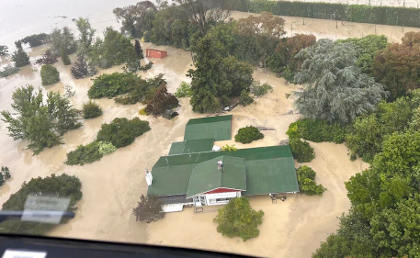Initial claims from Cyclone Gabrielle in New Zealand reach $890m

The Insurance Council of New Zealand (ICNZ) has recorded more than 40,000 claims for Cyclone Gabrielle totalling approximately $890 million, of which roughly $70 million has been paid.
Cyclone Gabrielle caused significant flooding and landslides across the North Island of New Zealand between February 9th and 14th.
The storm left 140,000 people across the island without power, and was described as the most significant weather event to hit New Zealand this century.
In fact, the impacts prompted the government to declare a national state of emergency for just the third time in history, and followed devastating floods in Auckland from January 27th to February 2nd.
“Aotearoa New Zealand’s insurers have so far paid out over $180m in claims across the Auckland Anniversary Weekend and Cyclone Gabrielle climate events,” said ICNZ Chief Executive, Tim Grafton.
Across the island, home and contents claims currently total 27,800 and are worth an initial $453 million. The ICNZ notes the impact on businesses as well, with initial claims value of more than $350 million recorded for related insurance.
Thousands of vehicles have also been either damaged or completely written off as a result of Cyclone Gabrielle, with motor claims of more than 5,000 worth over $73 million.
The Hawke’s Bay region has experienced the most claims, of more than 13,000, across all general insurance types. The ICNZ explains that while this accounts for roughly a third of all claims, such is the extent of the damage, the region actually accounts for over 50% of the total value of claims to date for the cyclone, at more than $481 million.
“Once again, the community response to this second climate-related disaster to hit Aoteraoa this year has been incredible. Insurers are doing all that they can to get assessments completed and to agree next steps with customers. In the meantime, insurers have been working hard to activate temporary accommodation benefits for homeowners and renters alike,” said Grafton.






